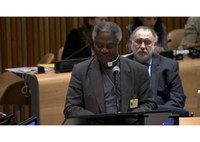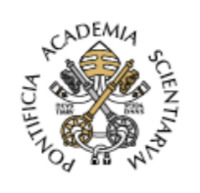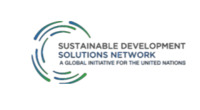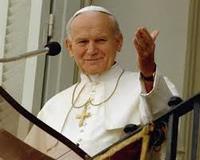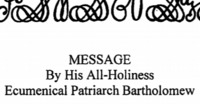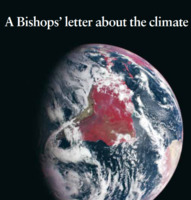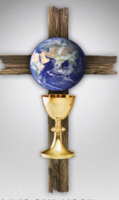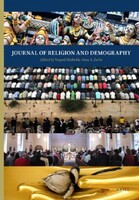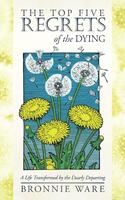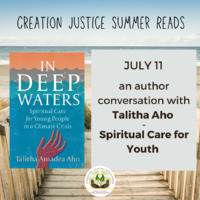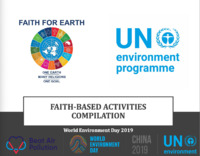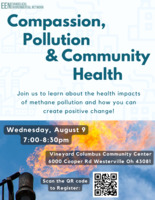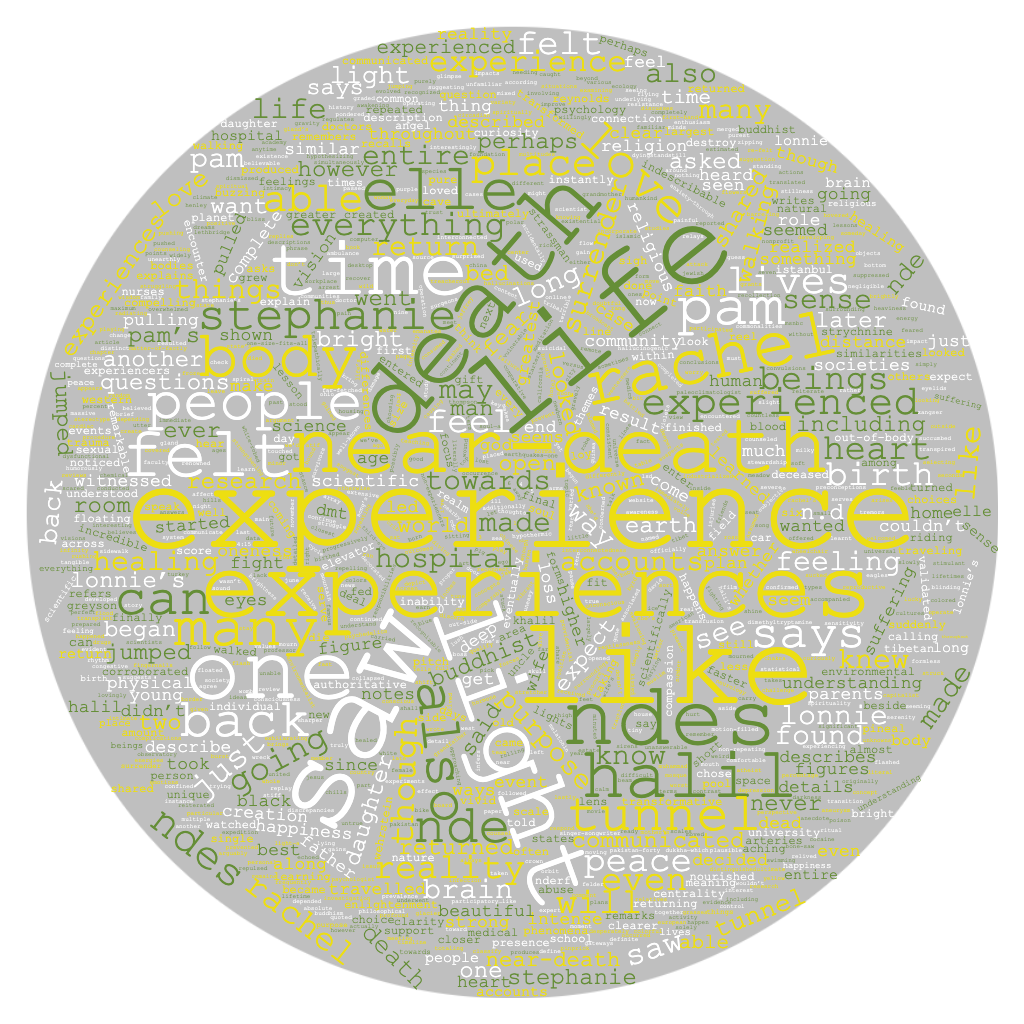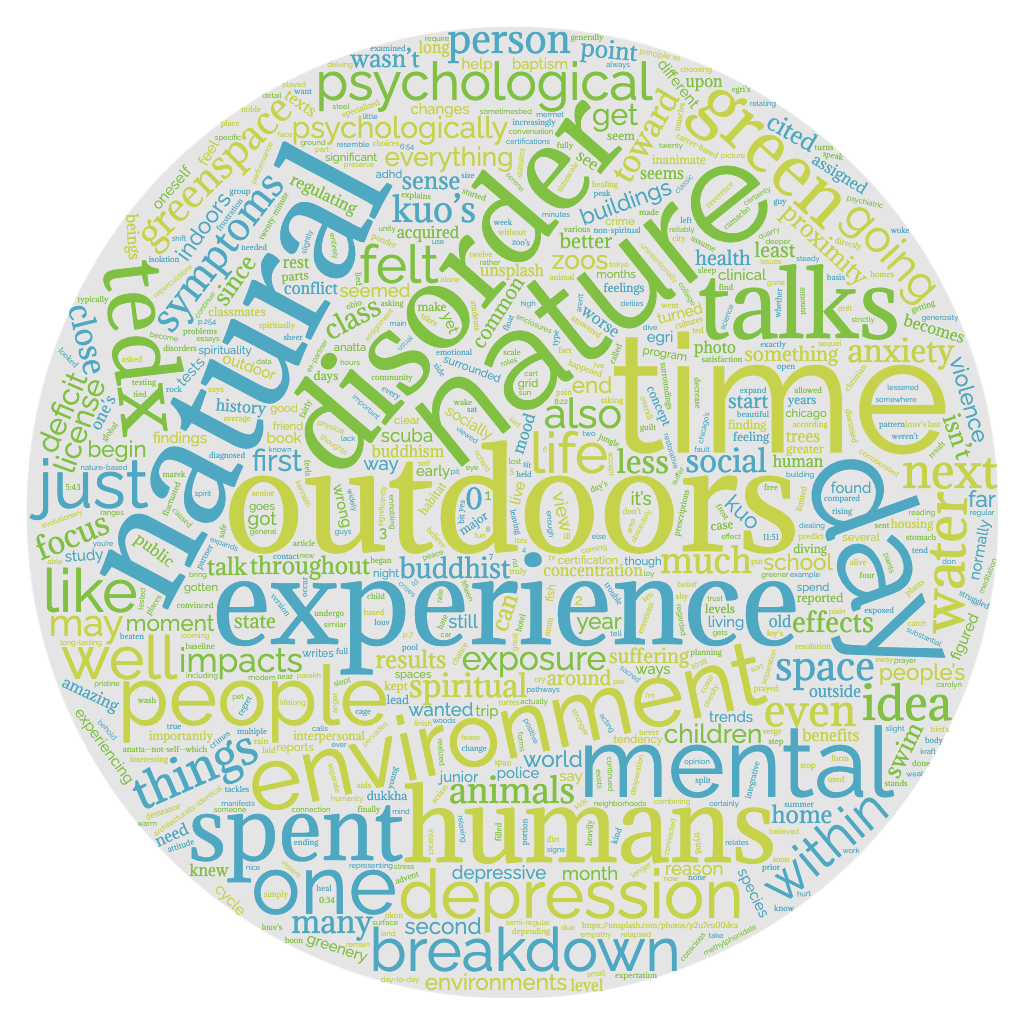Search
126 items
-
Statement by Cardinal Peter K. A. Turkson at the High Level Event on Climate Change
Cardinal Peter K. A. Turkson provides a statement on climate change at the United Nations High Level Event on Climate Change on June 29, 2015. He emphasizes that the plight of the poor and the fragility of the planet are intimately related. As stewards of the Earth, he therefore greatly urges individuals to make courageous choices in order to reverse the trend of global warming. -
Climate Change and the Common Good: A Statement of the Problem and the Demand for Transformative Solutions
The Pontifical Academy of Social Sciences prepared the following statement on climate change. It covers a wide range of associated sustainability issues. Various suggestions for societal interventions are also included within the statement. -
Declaration of Religious Leaders, Political Leaders, Business Leaders, Scientists and Development Practitioners
Business and political leaders, and scientists from around the world have congregated at the Pontifical Academies of Sciences and Social Sciences to address the climate change crisis. The introduction to the declaration is stated below:
"We the undersigned have assembled at the Pontifical Academies of Sciences and Social Sciences to address the challenges of human-induced climate change, extreme poverty, and social marginalization, including human trafficking, in the context of sustainable development. We join together from many faiths and walks of life, reflecting humanity’s shared yearning for peace, happiness, prosperity, justice, and environmental sustainability.
We have considered the overwhelming scientific evidence regarding human-induced climate change, the loss of biodiversity, and the vulnerabilities of the poor to economic,social, and environmental shocks." -
Address at the United Nations Climate Change Conference given by H.E. Archbishop James Patrick Green
H.E. Archbishop James Patrick Green provides a statement on the impact of climate change on poverty at the United Nations Conference in Lima, Peru on December 10, 2014. He discusses the interdependence of humans and the Earth. He emphasizes Pope Francis's call for intervention to fight against global warming in order to protect the planet and, in particular, those at the poverty level. -
Common Declaration on Environmental Ethics
On June 10, 2002, Pope John Paul II and Ecumenical Patriarch Bartholomew I issued a declaration on the environment. The introduction to the declaration is stated below:
"We are gathered here today in the spirit of peace for the good of all human beings and for the care of creation. At this moment in history, at the beginning of the third millennium, we are saddened to see the daily suffering of a great number of people from violence, starvation, poverty and disease. We are also concerned about the negative consequences for humanity and for all creation resulting from the degradation of some basic natural resources such as water, air and land, brought about by an economic and technological progress which does not recognize and take into account its limits." -
Global Climate Change A Plea for Dialogue Prudence and the Common Good
A Statement of the United States Conference of Catholic Bishops was issued on June 15, 2001. This document covers a multitude of current environmental problems and the resulting negative impact on populations around the world - especially with regard to indigent populations. It stressed the connectivity of human behavior and it's impact on the planet. -
Message by His All-Holiness Ecumenical Patriarch Bartholomew to the United Nations Conference of the Parties (COP 24) (Poland)
Ecumenical Patriarch Bartholomew I of Constantinople addressed the United Nations of the Parties (COP 24) in Poland, December 3-14, 2018. He emphasized the collective responsibility among all citizens to alleviate the climate problems. One key point includes the urgency to focus on lighter carbon footprints to preserve the Earth to assist in alleviating poverty and suffering.
-
Keynote Address by His All-Holiness Ecumenical Patriarch Bartholomew at the Arctic Circle Assembly
Ecumenical Patriarch Bartholomew I of Constantinople addressed the Arctic Circle Assembly in Reykjavik, October 13, 2017. Below is a section of the keynote address, focusing on the impact of climate change with regard to the Arctic Circle:
"Scientists tell us that the Arctic is a vibrant image and vivid mirror of the state of our planet as a whole. For scientists, the Arctic is the barometer of the globe's environmental health. The ecological misdeeds committed in other regions – including chemical contamination and nuclear radiation – are clearly evident in the Arctic environment. Above all, the dramatic rise in global temperatures is having a palpable effect on the Arctic landscape. Nevertheless, so many industrial societies and activities that cause climate change are often blind to the consequences of their behavior. But here, in the Arctic Circle, it is possible to see all manner of things so much more clearly. When we visit this pristine part of the planet, we cannot hide our eyes, either from the beauty of God’s creation or from the changes which human folly has generated. Nor can we avoid pondering the terrible consequences for the remainder – and the future – of the world, if glaciers continue to melt and sea-levels continue to rise." -
Common Declaration on Environmental Ethics
Pope John Paul II and the Ecumenical Patriarch His Holiness Bartholomew I delivered a speech titled Common Declaration on Environmental Ethics on June 10, 2002. Below is the introduction within the declaration, focusing on the current state of the poor and the consequences of natural degradation:
"We are gathered here today in the spirit of peace for the good of all human beings and for the care of creation. At this moment in history, at the beginning of the third millennium, we are saddened to see the daily suffering of a great number of people from violence, starvation, poverty and disease. We are also concerned about the negative consequences for humanity and for all creation resulting from the degradation of some basic natural resources such as water, air and land, brought about by an economic and technological progress which does not recognize and take into account its limits." -
A Bishops’ Letter about the Climate
Below is a section of the introduction from A Bishops’ Letter about the Climate, which covers a multitude of critical environmental issues, from the 2014 Bishops' conference:
"We have lived with reports and forecasts of climate change since the 1980s. Our climate is the result of the interaction of complex systems and there is often a great distance between cause and effect in terms of both space and time. There are uncertainties and a lack of clarity. However, the knowledge we possess today does not allow us to postpone until tomorrow
what needs to be done now. Our human climate impact must decrease for the sake of the earth, for the sake of the world that God so loves that God gave us Jesus Christ." -
The world is our host: A call to urgent action for climate justice
Anglican Bishops from around the world discuss various environmental complications resulting from climate change. They provide a list of initiatives of commitment that they have pledged as a church, some of which include strengthening collaboration among partners, developing and distributing educational resources and liturgical materials, and strengthening of ethical investment guidelines. They also list actions that individuals can take to support their mission. -
Episcopalians Confronting Climate Change
This article discusses American Episcopalians' concern over climate change and the impact with regard to those facing poverty. The introduction to the article is stated below:
"In September 2011, the House of Bishops in the Episcopal Church, attending a meeting in Quito, Ecuador, sent a pastoral letter to Episcopal clergy worldwide expressing 'mounting urgency' to address climate change within church membership. The letter argued the critical need for Christians to care for all of God’s creation and urged that justice be sought for the poor, who it said will suffer most from climate change." -
The Hope We Share: A Vision For Copenhagen
The Anglican Communion Environmental Network addressed the United Nations Framework Convention on Climate Change (UNFCCC)
Conference Of Parties (COP) Meetings, the Fifteenth Session, held in Copenhagen, Denmark in December 2009. They lament the consequences of environmental human footprints, some of which include the lack of drinkable water in various parts of the world, the increased difficulty to grow crops due to the water shortages, rampant consumerism, and subsidies for fossil fuels. -
Why Lutherans Care for Creation
This article discusses how various concepts of Lutheran theology are woven into ecological messages with regard to God as creator, human interactions, and ways of worship. The following is a section from the introduction of the article, emphasizing human responsibility towards care for the Earth:
"For Christians, care of the Earth is not an 'environmental cause.' Rather, it is central to our holy calling to treasure the Earth and to care for it as our common home, fully integrating creation-care into our love of God and neighbor. Without sacrificing the transformational effects of the 16th-century Reformation, we are called to embrace an eco-reformation that will re-examine and rethink how we read the Bible, how we can expand the scope of our theology, how we can reconfigure our personal vocation and our common ethic, how we worship, how we organize our church life together, and how we understand ourselves as creatures within creation as a whole. This call to continuing reformation is for the whole church, not solely for the committed. Earth care is not an add-on. It is not just for those who happen to be interested in it. It is a call for all Christians to participate in this great work of our time." -
The Coalition on the Environment and Jewish Life
The Coalition on the Environment and Jewish Life (COEJL) is a group within the Jewish Council of Public Affairs that focuses on environmental issues within the Jewish community. Their focus is on utilizing Jewish environmental knowledge to serve as a voice within in the broader interfaith community, through outreach and activism. Working among a network of Jewish leaders, institutions and individuals, COEJL seeks to conserve energy, increase sustainability, and advocate for policies that increase both energy efficiency and security. -
Religious Affiliation and Environmental Challenges in the 21st Century
This paper researches the relationship of religion and environment in the 21st century. They do this by studying religious affiliations from all over the world, and comparing and contrasting their results to examine the impacts those affiliations have on the environment. -
Lessons from Islamic Environmentalism: Interconnection, Structural Change, and the Limitations of Religious Environmentalism
In this article, Rosemary Hancock explores the lessons of religious environmentalism within the Islamic faith and discusses how these lessons were impacted by the coronavirus pandemic and the current environmental crisis. -
The Top Five Regrets of the Dying
"After too many years of unfulfilling work, Bronnie Ware began searching for a job with heart. Despite having no formal qualifications or experience, she found herself working in palliative care.Over the years she spent tending to the needs of those who were dying, Bronnie's life was transformed. Later, she wrote an Internet blog about the most common regrets expressed to her by the people she had cared for. The article, also called The Top Five Regrets of the Dying, gained so much momentum that it was read by more than three million people around the globe in its first year. At the requests of many, Bronnie now shares her own personal story.Bronnie has had a colourful and diverse past, but by applying the lessons of those nearing their death to her own life, she developed an understanding that it is possible for people, if they make the right choices, to die with peace of mind. In this book, she expresses in a heartfelt retelling how significant these regrets are and how we can positively address these issues while we still have the time.The Top Five Regrets of the Dying gives hope for a better world. It is a story told through sharing her inspiring and honest journey, which will leave you feeling kinder towards yourself and others, and more determined to live the life you are truly here to live. This delightful memoir is a courageous, life-changing book." -
In Deep Waters: Spiritual Care for Young People - an author conversation with Talitha Aho
"Join us for a captivating webinar as author Talitha Aho engages in a thought-provoking conversation about her book, 'In Deep Waters: Spiritual Care for Young People in a Climate Crisis.'
Discover how the climate crisis impacts the younger generation and the importance of offering ecologically informed spiritual care. Talitha will also discuss practical ways to care for and respect God's world, drawing on science, Scripture, and her expertise.
Whether you are a caring adult, a member of Generation Z, or simply interested in the intersection of Christianity and the environment, this webinar is not to be missed. Join us for an enlightening dialogue that will deepen your understanding, provide actionable strategies, and ignite hope in the face of our planet's challenges." -
UN Environment Programme Faith-Based Activities Compilation
"The World Environment Day is a UN day celebrated to promote awareness and inspire action. It has been celebrated since 1974. The event has grown to become a global platform for public outreach that is widely celebrated in over 100 countries...In the celebration of World Environment Day, 482 faith-based related activities were organized all around the world" -
Compassion, Pollution & Community Health
This event was created to help people learn about and discuss the health impacts of methane pollution and how to create positive change with the environment and community. -
Magic Mushrooms in Religion and Alchemy
This book discusses the roles that the fly agaric mushroom played in human perceptions of God through many religions. The same religious practices and stories present in some of the most prevalent religions of today can be explained by the beliefs held about Amanita muscaria. As it was thought to be eaten by the Gods, when humans consume it, they become closer to the divine. -
A Glimpse at the Reality Existing After Ours through Near-Death Experiences
This chapter from the student-written book “Emerging Perspectives on Religion and Environmental Values in America” explores the phenomenon of near death experiences through several first-hand accounts. The author explores the spiritual aspect of these experiences and compares and contrasts each instance. Below is the first paragraph of the chapter to introduce the discussion.
"Near-death experiences (NDEs) are gateways for the soul—a profound, transformative experience that has taken place for some who have kissed death and returned. It is estimated that NDEs affect 1 in 10 people (The European Academy of Neurology, 2019). At best, these experiences are dismissed as wild dreams or hallucinations, but we struggle to make sense of what they are. One way some scientists have been trying to explain the reality of near-death experiences is in the connection between psychedelics and psychology. Dr. Rick Strassman (2001), a psychologist who has done extensive research on the topic, is one among many hypothesizing that NDEs are a result of the hallucinogenic chemical dimethyltryptamine, or DMT for short. He suspects that DMT is produced in the pineal gland of the brain, which is an area of the brain we still know little about. Because of the pineal gland’s connection to light (what we do know is that it produces melatonin, a hormone that regulates both the reproductive system and the circadian rhythm), it has been spiritually associated with many ideas of a higher conscious and enlightenment such as the third-eye, crown chakra, and the seat of the soul. Strassman infers that DMT is produced in times of birth, near-death, death, and intense pain." -
Humans as Part of Nature: The Benefits of Time Spent Outdoors for Mental Health
This chapter from the student-written book “Emerging Perspectives on Religion and Environmental Values in America” explores the impact of connecting with nature and the environment on mental health. The author describes their own experiences with mental health problems and healing through activities in nature to frame this issue. Below is the first paragraph of the chapter to introduce the discussion.
"In the summer of 2019, I was a high-school junior going to be a senior the coming year, going on a SCUBA trip out of state with my specialized environmental science class so that I could finish up my certification. This time in life at the end of high school but before college is widely regarded as the most fun and free time for a young person. A time where you’re so close to the end of the life that your parents and the state have laid out for you and still far from the stresses of choosing for yourself in life and dealing with the repercussions of those choices. This expectation was far from where I was at that point in my life." -
Near Death Experiences and their Implications for the Afterlife
This chapter from the student-written book “Emerging Perspectives on Religion and Environmental Values in America” explores the science as well as the spirituality behind near-death experiences. The author assesses hypotheses behind this phenomenon and describes some examples of them occurring. Below is the first paragraph of the chapter to introduce the discussion.
"What happens after death is a mystery that humans all over the world have speculated on since the beginning of time. In many religions, there is a sense of certainty among the followers regarding what to expect when they pass, as promised by God or a higher power they worship. Although no one really knows for sure, the closest we have come to proving the reality of the afterlife are the stories told by people who have had near death experiences, or even died temporarily and came back to life. Spiritual revelations during these incidents are a cross-cultural phenomenon felt all over the world, with details that overlap and hint at the answer to this unsolved mystery."

